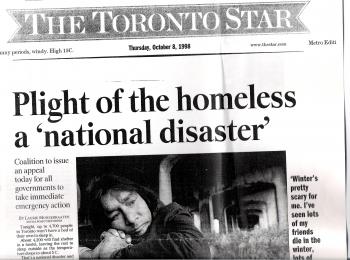Like this article? rabble is reader-supported journalism. Chip in to keep stories like these coming.
Eighteen years is a long time. I woke up this morning to realize that 18 years ago, on October 8, 1998 the Toronto Disaster Relief Committee launched its State of Emergency Declaration declaring homelessness a national disaster. Today, the entire country awaits a national housing program to alleviate the disaster.
Here are some memories from that day, an excerpt from my as yet unpublished memoir A Knapsack Full of Dreams.
I'm not a morning person but I wake up with excitement. I rush to my front door to pick up my Toronto Star. There it is. The exclusive we gave to them. It’s the front-page headline, bold and above the crease shouting: "Plight of the homeless a national disaster" and there is an accompanying in depth article by the respected social policy reporter Laurie Monsebraaten. It gets better. I open the paper to see page 7 almost exclusively dedicated to more on the story and the housing solution with a picture of Jack Layton, showing a house sitting empty in the middle of the crisis. I call my colleague and friend Beric German. He's pleased. We know that every politician in the country will be staring at this headline, forced to read the truth.
I get dressed and head to the downtown Church of the Holy Trinity, nestled between the Eaton Centre and a big hotel. This is where we will release our State of Emergency Declaration at a 10 am media conference. I feel so at home here. It's where we've launched so many of our campaigns over the years.
Would people come? Would media come? I worried, I always do. But, they do come and they come in droves. Media later reported there were five hundred people squeezed into the standing-room-only space.
I look out and am heartened there are so many poor and homeless people in the room, one of the reasons we served a hot breakfast. While the tension mounts, media keep arriving and work to attach their microphones to the lectern.
Internationally renowned Professor Ursula Franklin is our chair and she calls the room to order. Behind her a banner is hanging with bold black and yellow letter wording: "Homelessness a National Disaster." Another banner, red words on white, says "Relief Now." The dimly lit church is suddenly bright with the light of TV cameras. The emotion is palpable as Beric reads the declaration in his theatrical voice and declares "Homelessness is a national disaster." Applause and cheers. Ursula goes further: "But in contrast to the ice storm, this is a man-made disaster." Her German accent accentuates the word "man." She goes on: “This is not the result of coincidence or unforeseen or unforeseeable natural events. This disaster was predicted and predictable." She proclaims that in Canada we have the legal and technical means to end it. Then Rotarian John Andras warns: "If immediate emergency action isn't taken, the carnage on our streets this winter will be devastating."
Then I speak:
"It is wrong that a 74-year-old man is forced to live in a shelter.
It is shameful to not be able to offer an aboriginal man or woman shelter space or housing that meets their needs as a First Nations person.
It is wrong that by noon all the detox beds are full and people needing that support are left to languish on sidewalks.
It is wrong that a woman with HIV infection or AIDS lives in an emergency shelter.
It is wrong to police, institutionalize and jail people simply because they have no income or housing and may sleep in a park, panhandle, squeegee."
I read the names of 37 people who had died in the recent past. I am emotional and pause when I read Edmund Yu's name. The inquest into the police shooting of Edmund ended only yesterday.
One by one the audience lines up to sign the State of Emergency Declaration. They are homeless men and women, street youth, members of faith communities, seniors, social agency staff and housing workers. My heart swells with pride when Doris Grinspun from the Registered Nurses Association of Ontario (RNAO) signs the declaration. Nursing has come a long way I thought.
Months of work went into the preparation for this day. In fact years of work building other coalitions and momentum to create the "wind," the movement muscle to make this day possible.
Colin Vaughan, reporting on CP24 television, described the State of Emergency Declaration as the "best preparation on this particular subject that I’ve ever seen." He remarked that it had even shaken federal politicians to talk about long-term solutions such as increasing social housing. Without exception, media outlets covered the disaster declaration as a top local and national story. The story only grew when 20 days later City of Toronto’s Metro Council voted 53-1 to endorse the disaster declaration and it bounced across the country to similar city council meetings fuelling a huge national call for a national affordable housing program.
This was the day that the crime of homelessness in Canada was named a disaster and the truth was told. Since that day I have held on to my dream that it can be solved.
In memory of Ursula Franklin.
Note Since October 8, 1998 over 700 names have been added to the Toronto Homeless Memorial.
Photo credit: Toronto Disaster Relief Committee archives.
Like this article? rabble is reader-supported journalism. Chip in to keep stories like these coming.




Comments
Do
Don't